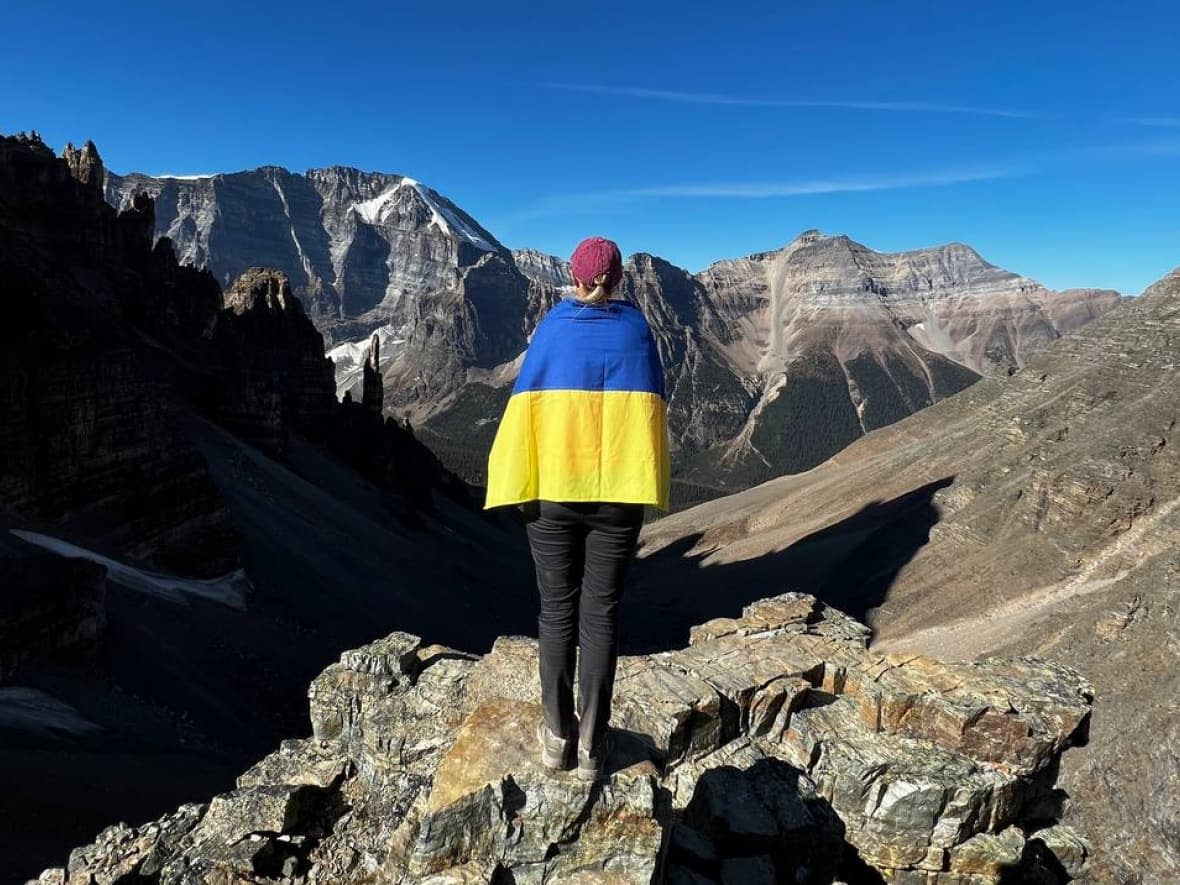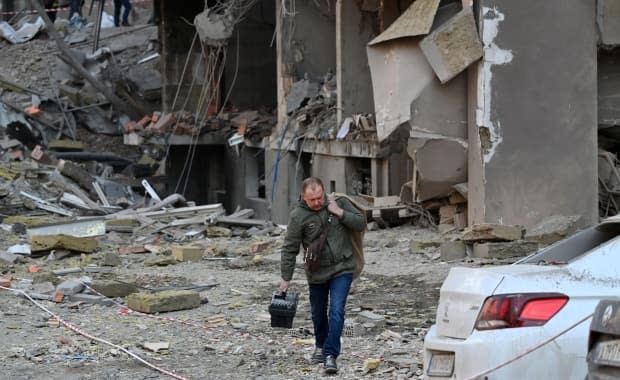Russian bombing shattered her dreams — now this newlywed is starting over in Calgary

Relaxing on a warm beach in Mauritius last February, Valeriia Marchuk kicked back and dreamed about an exciting future ahead of her.
The successful, 30-something, IT professional — on her honeymoon with her husband Anton — was busy making the kind of plans that newlyweds make.
"We want to buy an apartment, we want to give birth to our children, and so on," Marchuk recalled.
Then came the news that changed everything.
Russian forces had launched an attack on Kyiv, Ukraine, with her apartment building turned to ruin. Her home, possessions and dreams — all shattered.
"My life back in Ukraine was ruined," she said. "All my plans were ruined."
What followed was a difficult, near-three-month odyssey.
All I had to [bring to] a cold Canada was shorts and T-shirts." - Valeriia Marchuk
Marchuk and her husband — newlyweds turned exiles — made their way to Europe. They then arranged to meet her sister, who had moved to Waterloo, Ont., three years ago. Using most of their savings, the couple left for Canada.
After two months in Waterloo, the entire group decided Calgary made better sense. Less expensive housing, the prospect of better-paying jobs and a well-established Ukrainian community all played into the decision.
In July, the family of eight settled into a two-bedroom condo in the city's southeast. Marchuk's only possessions were the clothes she'd packed in February for her honeymoon.
"All I had to [bring to] a cold Canada was shorts and T-shirts," she said.
Everything was new — the language, the city, the culture. Learning English became a top priority for her.
"Amazing people in Canada who help us with clothes, who help us understand how we should [be] looking for [a] job, how we can improve our English so we can rebuild our resumé," she said.
It was an English teacher that told Marchuk about Canada's volunteer culture and suggested donating her time to the Calgary Food Bank as a way of improving her language skills and helping her find a sense of community.

Marchuk started volunteering at the food bank's main depot in southeast Calgary.
It wasn't long before she heard through a friend the agency was looking for someone to help co-ordinate their relatively new outreach program at St. Vladimir's Ukrainian Orthodox Church in Crescent Heights.
They needed someone who knew both languages, who could explain what a food bank is and the services offered.
People unfamiliar with food banks often believe there's some kind of catch. Either they think there is a fee involved that will have to be paid later or worry accepting charity could impact their immigration status. Neither is true.
Marchuk jumped at the chance to help, and soon her volunteer position turned into a two-day-a-week paid position. She calls it a dream job — and the food bank is pleased to have her.
Filling a critical role
Maria Topolnyski, a program co-ordinator at the Calgary Food Bank, was instantly impressed. At St. Vladimir's, Marchuk is helping Ukrainian evacuees navigate their new surroundings.
"A lot of Ukrainians are arriving here as evacuees," Topolnyski said. "They're coming with the support of the Canadian government but not with refugee status like you would see from previous conflicts."
Without that status, the amount of monetary support they receive is nominal. The language barrier also makes it hard for Ukrainians to discover all the other government support they might get.
Marchuk is filling a critical role.
"She's doing all the translation, she's explaining how it works, all those kinds of things," Topolnyski said.
She estimates Marchuk is seeing one person every 10 minutes for every hour she works — and the lineups are long.

Before one of her busy shifts, Marchuk described what a typical Saturday would have looked like for her in Kyiv only a year ago.
Breaking out a broad smile, her thoughts drift back to a bright sunny day. It started with breakfast and meeting up with friends. Shopping, museums, coffee at outdoor cafes — the joys of life in a bustling city of nearly three million people, roughly the same size as Toronto.
Looking back at it now, Marchuk is amazed at all the little things she used to worry about. A taxi being late, office politics, the latest fashion. Now all that stuff seems so inconsequential.
Survivor's guilt
Even with all she's been through, Marchuk believes she's lucky — lucky to have married her husband, lucky to have found a safe place to live in Canada and, especially, to not have been in Kyiv when Russia invaded her country.
Marchuk says it's hard to live with the survivor's guilt she feels every day, but she sees a silver lining.
"I think it's helped me to help my fellow Ukrainians build their life here," she said.
If given the chance, Marchuk doesn't think she has it in her to start her life over again in Ukraine.
The couple is now making a mark in Calgary. Marchuk's husband has landed a full-time job in IT, and she has parlayed her volunteer position into a full-time role as a communications assistant at the food bank.
If the last year has taught her anything, it's to appreciate today, because as she's learned first-hand, the future is not guaranteed.


